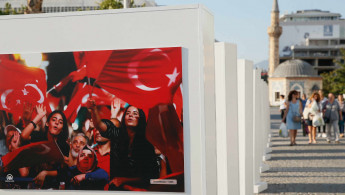Turkey 'struggling to overcome the trauma' of 2016 coup attempt
A major programme of events will be held in Turkey on Saturday to mark last year's coup attempt, blamed on US-based Muslim preacher Fethullah Gulen.
"One year on, we are still struggling to overcome the trauma of this existential threat," Ambassador Abdurrahman Bilgic said at his residence in central London.
Bilgic gave a detailed account of the events that happened on July 15, 2016, followed by a description of the ongoing investigation and national state of emergency.
He spoke of the "unmistakable footprint" of 'Gulenists' before commending the UK's "unwavering support" to his government.
His comments come as a total of 7,563 police, soldiers and ministry officials were dismissed, while 342 retired army personnel were stripped of their ranks in the country's latest purge. The move follows a new decree published on Friday under a state of emergency imposed after last year's failed coup.
Prime Minister Binali Yıldırım said on Friday that Ankara was considering extending the state of emergency for another three months, entering into its twelfth month from Saturday.
According to the ambassador, a state of emergency was necessary to "make the state organs act swiftly and effectively".
Human rights
On Friday, President Recep Tayyip Erdogan called the coup itself the "gravest violation of human rights," before criticising the opposition party, CHP, for bringing up human rights issues.
The leader of the CHP, Mustafa Tanrikulu, addressed Parliament the day before about the arrest of ten prominent human rights activists detained on July 5 on Istanbul's Buyukada Island.
"On which grounds were they detained? What's the reason behind detaining them in such secrecy?" Tanrikulu asked.
The RSF 2017 World Press Freedom Index, a comparative register on each country's treatment of journalists, found Turkey to be the "biggest prison for media personnel".
An open letter signed by six leading human rights NGOs on Thursday criticised the arrest, calling it "an ominous indicator of the direction Turkey is heading in."
|
The Turkish government has adamantly insisted that the US-based cleric, Fethullah Gulen, was behind the coup in July, which saw assassination attempts against the prime minister and the president.
Turkish warplanes flew low over the city as President Erdogan urged Turkish people to "take to the streets" in response, causing the coup to fail.
The government said 250 were killed as a result of the violence, after some soldiers responded by firing on the crowds of protesters.
A UK foreign office minister told a Parliament committee in February that the UK had no evidence that Fethullah Gulen organised the coup.
"We've asked the Turkish government for this evidence," said Sir Alan Duncan.
"It's very clear that there were many Gulenists involved in the coup, but we don't have the information or evidence to decide [this issue] definitively."





 Follow the Middle East's top stories in English at The New Arab on Google News
Follow the Middle East's top stories in English at The New Arab on Google News
![Israeli forces ordered bombed Gaza's Jabalia, ordering residents to leave [Getty]](/sites/default/files/styles/image_330x185/public/2176418030.jpeg?h=a5f2f23a&itok=_YGZaP1z)

